Clearing Air in Cancer Alley
Air Date: Week of July 18, 2025
Until its announcement on May 13, 2025, the Denka Performance Elastomer plant in LaPlace, Louisiana manufactured neoprene, a synthetic rubber that is found in products such as wetsuits and laptop sleeves. The manufacturing process emitted chloroprene, a cancer-causing chemical, among other pollutants. (Photo: Andrew J. Skerritt)
Residents of Reserve, Louisiana in “Cancer Alley” recently received stunning news that Denka Performance Elastomer, which has for years emitted high levels of cancer-causing air pollutants, would indefinitely suspend its operations. Tish Taylor of Concerned Citizens of St. John speaks with Host Jenni Doering about illnesses her family has endured, her community’s cautious celebration of the decision and cleaner air and how her fight against environmental racism continues.
Transcript
O’NEILL: It’s Living on Earth, I’m Aynsley O’Neill.
DOERING: And I’m Jenni Doering.
Just two months after the Trump administration announced plans to drop a Biden-era lawsuit against Denka Performance Elastomer, residents of Reserve, Louisiana were greeted with stunning news. The plant’s Japanese owners said that they were indefinitely suspending operations of its manufacturing of neoprene, used in laptop sleeves and wetsuits. The predominantly Black community of Reserve in St. John the Baptist Parish is in what’s known as Cancer Alley, in the shadow of petrochemical plants emitting cancer-causing air pollutants. Many residents of Reserve are descended from enslaved people who toiled on sugar plantations. In fact, Dupont constructed the plant in 1968 on a former sugar plantation and sold it to Denka a decade ago while retaining ownership of the land itself. For years, Tish Taylor, her father Robert Taylor ,and their organization, Concerned Citizens of St. John have been advocating to curb air pollution from the plant. Their efforts were aided by the Biden EPA and Department of Justice, which sued Denka in early 2023, alleging that the plant posed unacceptable cancer risks. But the Trump administration dropped that case as part of its dismantling of environmental justice initiatives designed to reduce the exposure of low-income and communities of color to industrial air and water pollution. Tish Taylor joins me now. Tish, welcome to Living On Earth!
TAYLOR: Thank you so much for having me.
DOERING: So how did you learn about Denka's plans to suspend its operations indefinitely?
TAYLOR: Oh, what a wonderful day. Well, I received an email from one of our environmental justice leaders from the Sierra Club saying that they were supposed to be releasing a statement. And not long after I read the email, a text message popped up with the link to their website, with their final statement, saying that they were going to not restart the plant after that shutdown. They were not going to restart the neoprene plant, and I didn't know how to feel at first, because, you know, this has been such a long battle with them spending lots of money on their lawyers and everybody, scientists, everyone. The battle was so long, and I never thought that they would actually say, ah, we just we quit. But, you know, it was because of money, you know, more than anything. But we affected that. We affected it at every level we could. We fought them. And I was elated. I couldn't believe it. And I jumped out the bed. I ran over to my dad, to his room, and he's like, looking at it in his hand on his phone. And I'm like, Daddy, this city is shutting down indefinitely. I don't believe this, you know. And he's like, I don't know, you know, because you don't, you're scared, you know. But it was, it was real. It was a declaration on the statement on their website. Oh, my God. It was so wonderful. I mean, I went outside, I smelled my flowers. I couldn't even wipe the smile off of my face. It was unbelievable. I love my flowers. I love my garden. And every time I go out there, that's normally my refuge, my plants. And I would go out, water them, talk to them, of course, weed them. And I would always have this little nagging thing behind me saying, you're breathing chloroprene. You, how much? What's the levels today? I wonder how much they poisoning us today?
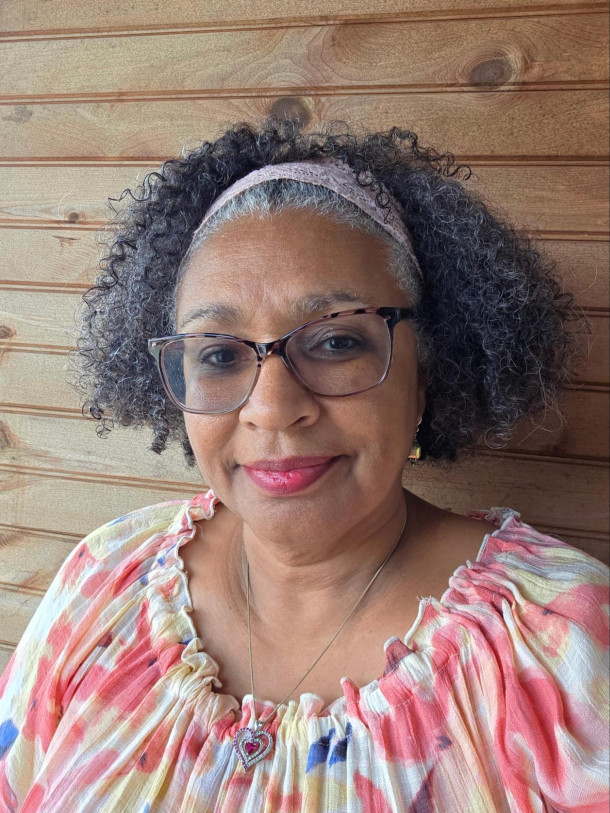
Tish Taylor is the program director of Concerned Citizens of St. John, an environmental advocacy group fighting to reduce pollution by Denka and other petrochemical plants in the Cancer Alley community of LaPlace, Louisiana. With Denka announcing the suspension of operations, Taylor said she can go outside and tend to her garden in chloroprene free air. (Photo: Tish Taylor)
DOERING: Remind us why was that so concerning? Knowing that you were breathing in chloroprene?
TAYLOR: We found out that chloroprene changes your DNA. It's a mutagen. I have this perfect grandson. He's three years old now. Of course, he was born premature, because that's very common in Cancer Alley, low birth weight, but he also had little patches of eczema, and he's autistic. But knowing that he was coming home to the exposures of chloroprene and understanding that in two years of his life, he would have exceeded his lifetime levels of exposure to chloroprene at two years old.
DOERING: Wow.
TAYLOR: So he already has that because he's three now. He's been exposed.
DOERING: Now Tish, I understand that living in reserve next to Denka and other Cancer Alley petrochemical plants has really exacted a price on you and your family. Can you please tell us about that?
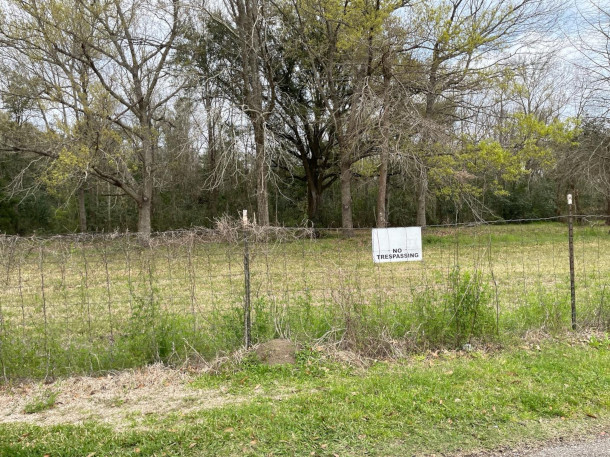
The fence surrounding the Denka plant sits across the street from homes in Reserve, Louisiana. (Photo: Andrew J. Skerritt)
TAYLOR: So we have unbelievable amounts of illnesses. My mom is a breast cancer survivor, later diagnosed with multiple sclerosis and heart disease. So for 22 years, we were in and out of hospitals with her, and she passed away this, this December, December, 31. Twenty two years of suffering, no quality of life. You have to understand. Grasping at good days and struggling through bad days. My sister has a very rare autoimmune disease, and that's very common in my community.

Tish (center left) and Robert Taylor (center right) and Concerned Citizens of St. John Board Member Larry Saropuru (left) celebrate the signing of the HON Rule with then-EPA Administrator Michael S. Regan (right) in 2024. The rule aims to reduce emissions of hazardous air pollutants (HAPs) from chemical plants. This photo was originally posted on the EPA website but has since been removed. (Photo: EPA, public domain)
DOERING: You know, you mentioned that the struggle against the Denka plant's emissions was so hard. What was that struggle like?
TAYLOR: Well, EPA gave them a goal. They had to lower their emissions of chloroprene to 0.2 micrograms per cubic meter of air. At that time, they were emitting 400 to 800 micrograms per cubic meter of air. So now you have to go from hundreds to two tenths of a microgram. Of course, they started fighting it. They said that EPA was wrong. Their science says everything is great. We are healthy. So we started. We started just advocating. My dad started the organization. My dad, Robert Taylor, is the founder and executive director. We started having meetings. We had a scientist to come down and give us the information, because they were forced to put monitors all around and share that information. So we started putting together marches to the state capitol, because we knew that without the Louisiana Department of Environmental Quality actually regulating, that it would not happen. And we all know the history of LDEQ was that they were pro industry. So marching to our governor, saying, 'You need to protect us. You need to come in and do this.' We held meetings with the School Board to let the parents know and the School Board know that they needed to be aware of the chemicals that the students at Fifth Ward Elementary, which was less than 1200 feet away from the plant that they were exposed to. These are children from kindergarten to fourth grade. So we wanted them to know, and we held community meetings. We went to the Parish Council meeting, Parish Council meeting and the School Board. The head of LDEQ actually attended those meetings and said that we were lying, that my dad was a fear monger disseminating mistruths. And the Department of Health, the head of the Department of Health attended the Parish Council meeting and said that, the first one said, there is no safe level of chloroprene, and it actually covers the entire parish. And he had to resign. The new one came and said that we were actually exaggerating the numbers and the health risks of it. So we had the state Health Department and LDEQ actually lying to the community, and that's who community is supposed to trust, you know? And we had the governor totally ignoring us, but EPA came in and they started investigating, and that's a whole other story.
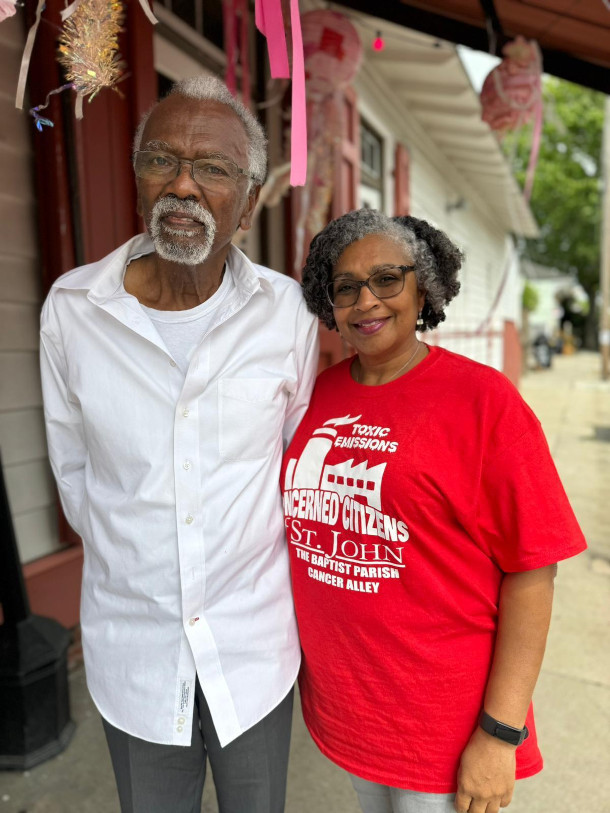
Tish Taylor (right), alongside her father, Robert Taylor (left), who founded the advocacy group Concerned Citizens of St. John in 2016. (Photo: Tish Taylor)
DOERING: What has been the reaction of local St John Parish officials and Denka supporters to the plant's production halt?
TAYLOR: Our parish president said that we're going to lose $2 million in taxes, which it should have been about 200 million over the last 10 years or so. You know, you give those people tax breaks, and $2 million is a drop in the bucket, and we don't see it anyway, so we don't care. And of course, she was concerned about the jobs. The community was worried about the jobs of the contractors, you know? What happens to those people? And then we have people who are giving us hugs and high fives, and 'Y'all are great. We're so happy that y'all did this because we don't have the poison.' So it's a mixed group, but we know what we did was for everyone in this parish, and that it benefited them. Their opinion, whether it's positive or negative, has no bearing on the outcome of our advocacy, because we did that. We did that. I'm just so happy that we went all around full circle in our advocacy to make sure we affected them every way that we could. Because in the meantime, we're dying. In the meantime, a new baby is being born and brought here to be exposed. So it was just important to just make sure that this was not gonna happen anymore. And that's what happened. They shut down.
DOERING: Now. Tish, you know now that Denka has announced plans to suspend their operations for now, what concerns do you have over the future of the plant?

Four generations of Taylors: Robert Taylor (center), Tish Taylor (right), her daughter Teesha (left), and grandson Cairo (front center) live in LaPlace, Louisiana, which has some of the highest exposure to cancer causing chemicals such as chloroprene and ethylene dioxide. (Photo: Tish Taylor)
TAYLOR: Well, Denka actually leases the neoprene plant facility itself from DuPont. So DuPont is still connected. They're still running. It's on their site. So they're decommissioning right now, so we have to make sure that they're actually removing the chemicals, making it safe. And you know, after they leave, we don't want a Superfund site. But ultimately, they said they're not going to restart the plant indefinitely, but they are definitely trying to see if they can sell it to someone else. So we are concerned now with, who you're going to sell it to, and how can we make sure that they don't get any permits to come in if they're going to do something that's even more toxic or even the same. It has the same effect on our community. So we have to watch now, they are getting permits to remove 1-3 Butadiene from the plant, which is good. It's another one of those bad chemicals. So we know that they are actually in the process of removing and doing the cleanup. But we're trying to schedule a meeting with the parish council members to find out if they're actually actively watching the decommissioning of the plant, or if they're just leaving it up to them. Because if they are, they can just back out anytime and leave a toxic mess. So the advocacy never ends. We want that place cleaned up, and we don't want anything else that's coming in that's going to hurt us.
DOERING: So you know, the Trump administration, it scuttled the Biden legal action on enforcement against Denka. It also moved to cut funding for environmental justice groups like yours across the country. It's also conflating environmental justice with what it calls “illegal DEI,” diversity, equity and inclusion. How is all this affecting your organization's ability and will to fight?

Exposure to pollutants has taken a heavy toll on Tish Taylor (right) and her family. Robert Taylor’s late wife, Zenobia (center), battled cancer and other illnesses, while his other daughter Raven (left), is struggling with auto-immune illness. (Photo: Tish Taylor)
TAYLOR: Well, when we first started, there was no money, okay? And, you know, you just start by philanthropy, you know, giving donations. So when the Biden administration showed up, it was like an injection of adrenaline. It was like, here we go. We acknowledge this. It's real. Let's do something about it. And they started working on this IRA, all of this stuff was wonderful. The thing about it is, as Dr. Beverly Wright stated, we didn't have money before, and we did it, and we're not going to stop ever. So we got the boost. It was great, but we still move on in the advocacy and we find a way.
DOERING: So before you go Tish, what have you learned from this Denka struggle, and what gives you hope amid all of this environmental injustice and environmental racism that you've experienced?
TAYLOR: Well, I can tell you that my next grandchild won't come home to chloroprene, and that is what matters. We made a difference, and we're going to make a difference, and it doesn't matter who knows or who sees it, or who doesn't smell a particular chemical all of a sudden, because it's not about that; it's about that it's not there, and the advocacy has to continue. I cannot ignore it. Either you have it in you or you don't, and if it's in you, you're gonna just step out to the forefront and say, Okay, this is my job now. I fight for environmental justice. We need to live. We need to live clean. And at first I could not get out of the bed in the morning, the struggle to just get up knowing, first of all that it's real, it's true. We've been poisoned all our lives. My sister is sick because of this. My mama died because of this. My neighbors are dying. We're burying people every week because of this? For somebody else to make billions of dollars? You have no choice but to get up and fight, because you know better. You know you deserve better. You know your people deserve better. So it has to continue, because it's always going to be something. So if you're strong enough to fight, you fight, and if you need to retreat and take care of yourself, then you retreat. But then you come right back out strong and you fight again, because you have to for the next generation and the next generation and for this Earth. You have to do it.
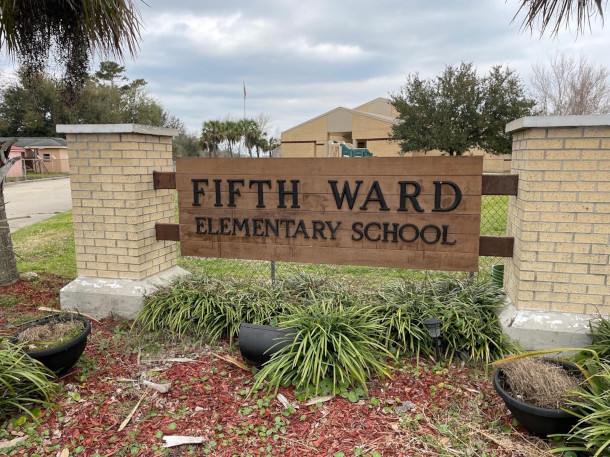
Generations of Reserve children have attended school in the building that housed Fifth Ward Elementary. The school sits on the fence line of the Denka property. (Photo: Andrew J. Skerritt)
DOERING: It takes a lot of courage to keep showing up for that fight.
TAYLOR: It takes a lot of courage to get up and know what's going on every day, and to get out the bed and just do your daily everything. It takes courage. Black people courageous. This is a world that we fight every day that's built to kill us, to kill our spirit. We don't have a choice but to be courageous. There's no other option but to be courageous. I'm no stronger than anybody else. I just picked up this one, this torch, but sometimes just picking your head up off the pillow is a lot.
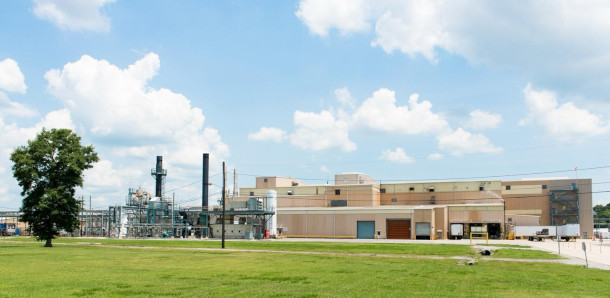
Reserve, Louisiana is home to other companies whose emissions worry Tish Taylor and members of Concerned Citizens of St. John. In 2023, the U.S. Environmental Protection Agency reached a settlement with Evonik Industries to reduce emissions of ethylene oxide and other hazardous air pollutants by 5.6 tons per year. (Photo: Courtesy of Evonik Industries AG)
DOERING: Tish Taylor is Program Director of Concerned Citizens of St John. Thank you so much, Tish, for sharing your story.
TAYLOR: You're welcome. I'm so happy to be here. Honored for you to actually listen to our story.
Links
The Guardian | “Louisiana: Controversial Denka Plant Suspends Production After Dire Losses”
Click here to read Denka’s statement about the suspension of production
Living on Earth wants to hear from you!
Living on Earth
62 Calef Highway, Suite 212
Lee, NH 03861
Telephone: 617-287-4121
E-mail: comments@loe.org
Newsletter [Click here]
Donate to Living on Earth!
Living on Earth is an independent media program and relies entirely on contributions from listeners and institutions supporting public service. Please donate now to preserve an independent environmental voice.
NewsletterLiving on Earth offers a weekly delivery of the show's rundown to your mailbox. Sign up for our newsletter today!
 Sailors For The Sea: Be the change you want to sea.
Sailors For The Sea: Be the change you want to sea.
 The Grantham Foundation for the Protection of the Environment: Committed to protecting and improving the health of the global environment.
The Grantham Foundation for the Protection of the Environment: Committed to protecting and improving the health of the global environment.
 Contribute to Living on Earth and receive, as our gift to you, an archival print of one of Mark Seth Lender's extraordinary wildlife photographs. Follow the link to see Mark's current collection of photographs.
Contribute to Living on Earth and receive, as our gift to you, an archival print of one of Mark Seth Lender's extraordinary wildlife photographs. Follow the link to see Mark's current collection of photographs.
 Buy a signed copy of Mark Seth Lender's book Smeagull the Seagull & support Living on Earth
Buy a signed copy of Mark Seth Lender's book Smeagull the Seagull & support Living on Earth

